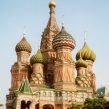
KREMLIN CALLS ON COMPATRIOTS TO COME BACK TO MOTHER RUSSIA
Publication: Eurasia Daily Monitor Volume: 3 Issue: 29
By:

The Kremlin has set up a commission charged with encouraging the denizens of the former Soviet republics to migrate to Russia. Although Russia is experiencing a severe demographic crisis and needs migrants to sustain its economic development, the government’s ambitious repatriation plan appears to be a PR move rather than a viable policy, analysts say.
According to Russian President Vladimir Putin’s decree, posted on his website on February 7, an interagency working group will aim to assist “in the voluntary resettlement of our compatriots residing abroad to Russia.” The group numbers 34 people and includes ministers, governors, and presidential administration officials. Its task is to elaborate a “state program” on voluntary repatriation to be submitted to Putin by June 1.
Many international and local experts have long pointed to Russia’s deplorable demographic situation, saying the country’s population is dying out at a dramatically rapid pace. In the years since the breakup of the Soviet Union, the average birth rate in Russia has plunged from 2.5 million per year between 1992 and 1995 to around 500,000 per year between 2001 and 2004. In a report last year, the World Bank estimated that Russia’s population could shrink from 144 million to 119 million by 2050 if the current downward trends in birth rates continue, posing a threat to vital industrial sectors and the country’s long-term economic viability. To avoid this, Russia would need at least 1 million immigrants per year, the report said. Russian policymakers appear to see the former Soviet lands as a natural source of migrants, as millions of Russians are still scattered across the vast expanses of the former Soviet empire.
But there are at least three problems that make the success of the Kremlin’s plan to bring the compatriots from the “near abroad” to Russia proper unlikely.
First, is Putin’s extravagant choice of a person to head the repatriation working group. The Kremlin leader decided that the right man to lead the team would be his aide and long-time KGB colleague Viktor Ivanov. At first blush, Ivanov’s appointment seems quite natural, as he oversees personnel and citizenship issues in the presidential administration. But the sad irony is that the same Viktor Ivanov is the author of the current citizenship law, which has been widely criticized as draconian and imposes strict bureaucratic procedures for immigrants seeking Russian citizenship. The State Duma passed the bill in 2002, but the public outcry against it was so strong that Putin was forced to send it back in 2003 with a raft of amendments. The president conceded that the initial version created “unnecessary obstacles for our compatriots who want to acquire Russian citizenship.” As one commentary quipped recently, it would be more natural if Putin charged Ivanov with drawing up a program preventing repatriation.
Second, it is unclear who should be regarded as a “compatriot.” It would appear, some officials say, that the program should mainly target the Slavic population and Russia’s “indigenous peoples,” but how exactly it should be formulated remains debatable. “There is a suggestion to encourage the resettlement of largely high-skilled cadres, as they tend to be Russian speaking,” a Federal Migration Service official told business daily Vedomosti.
But Valery Tishkov, director of the Institute of Ethnology and Anthropology at the Russian Academy of Sciences, dismissed the notion of an ethnic-based scheme as nonsensical. “The repatriation of ethnic Russians from neighboring countries that has been talked about recently is absurd, although the coming here of all who want to come…is an extremely desirable thing,” Tishkov said at the February 8 news conference in Moscow.
Third, there’s no consensus on what incentives would lure the compatriots to move to Russia, particularly to Siberia and the Far East, regions that are dramatically under populated. The fact that the interagency group includes Kamil Iskhakov, the new head of the Far Eastern Federal District, hints at the Russian government’s concern about the future of those sparsely populated lands that face tremendous demographic pressure from the excessive Chinese population across the border. However, the officials are unsure about the measures they must take to stimulate migration to these inhospitable territories. No one has any idea, they say, of how to offer subsidies and various privileges to the prospective migrants when the local Russian population has not seen any financial assistance from the state.
That said, the Kremlin project may still have a considerable propaganda value. Last year, Putin famously characterized the Soviet collapse as the greatest tragedy of the 20th century. To be sure, the ultimate objective of a true derzhavnik (great power champion) is to “gather the historic Russian lands.” As this task appears unfeasible, “gathering the Russian people” would be the second-best choice in the pre-election year, which, incidentally, also marks the 15th anniversary of the Soviet Union’s unraveling.
(Moscow Times, AFP, February 9; Vedomosti, February 8; Kremlin.ru, Gazeta.ru, February 7)




